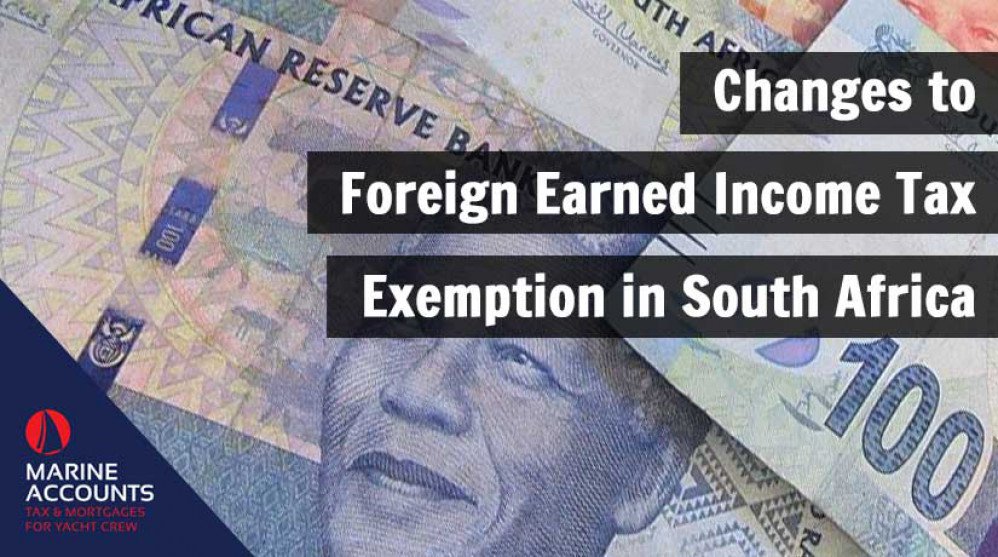Breaking News: Changes to Foreign Earned Income Tax Exemption in South Africa
- Authors
-
-

- Name
- Patrick Maflin
-

Image source: https://pixabay.com/photos/money-south-africa-nelson-mandela-2951142/
With much fresh discussion around the upcoming changes to South African taxation for expats and how they may affect yacht crew, we felt strongly that the situation should be clarified before the changes are put in to practice in March 2020.
As such, we have now updated our previous article, last published in June 2018, with more information so that you know exactly where you stand.
To fully understand the recently updated legislation, read on to find out more or use the chapter links below to jump to a section as desired:
Chapters
- Background
- What Must I Do to Qualify?
- Exemption Requirements
- How Do SARS Define a Crew Member?
- Is the Exemption Just for Yacht Crew?
- What If I'm Paid Whilst Not Onboard?
- What Do I Need To Do?
- Speak to Us or Comment!
Background
This update comes in order to clarify who will and won’t be affected by these changes with reference to Interpretation Note 34 (Issue 2) published by SARS 27th February 2017.
Broadly, the new legislation states that South African tax residents will be liable for taxation of their income over the 1 million Rand (ZAR) tax free threshold at a rate of up to 45%.
Whilst some have interpreted that this means the employment income of South African yacht crew will no longer be exempt from taxation, certain qualifying requirements will remain meaning this is not the case for many crew members.
What Must I Do to Qualify?
The question which you're sure to now ask is “How can I maintain my qualification?”.
Fortunately, the South African Revenue Service (SARS) have set out simple guidelines for you to follow.
Section 4 of the literature published by SARS lays out the following guidelines.
Exemption Requirements
In order to qualify for the exemption, a taxpayer must:
- Come by their income through engagement as an employee i.e. not through self-employment.
- Be working outside the territories of the Republic of South Africa*
- not exceed 183 days in South Africa in any 365-day period. This does not refer to calendar or tax year but any given 365 days. (Following the changes in tax legislation, you will be required to begin a new 365-day qualifying period beginning 1st March 2020).
*(Section 4.4 of Interpretation Note 34 clarifies that the Territories of the Republic of South Africa are defined as the land mass in its entirety as well as it’s territorial waters up to the 12-nautical-mile limit)
SARS have decided to look kindly upon the situation of yacht crew and other seafarers given that your employment situation is much different than you are likely to find in most other industries.
How Do SARS Define a Crew Member?
In order to maintain clear boundaries around who may and may not claim the exemption, SARS have published guidelines to clarify who can be seen to be a crew member in their view.
For the purposes of the exemption a crew member must:
- Remain under contract of employment whilst on the vessel (as stated earlier those operating on a self-employed basis may not make a claim). (Section 4.2, Interpretation Note 34)
- Be employed to assist directly with the navigation of the vessel. The literature clarifies that to qualify crew must contribute to the continuous, speedy and efficient operation of the vessel. For example, a geologist who is engaged aboard to carry out a survey will not qualify to claim the exemption (Section 4.3.2. Interpretation Note 34).
Any South African tax resident crew member who meet the above requirements will still be entitled to declare their employment income to SARS without incurring a tax liability post March 2020.
Is the Exemption Just for Yacht Crew?
Section 4.3.2 of the Interpretation Note which SARS have issued states that the exemption does not apply to yacht crew alone.
Providing the above criteria are met, crew aboard vessels engaged in prospecting, exploration, mining or production are also eligible to claim the exemption.
What If I'm Paid Whilst Not Onboard?
It is important however to remember that the exemption applies only to days which have actually been worked i.e. holiday pay, sickness pay or maternity pay will not qualify to be claimed as tax free.
As such it may be worth discussing with your employer the possibility of a statement in your contract confirming that any salary relates only to those days in which you are actually engaged on board the vessel.
What Do I Need To Do?
The final item to note is that the exemption is not automatically applied to your income.
In order to claim your entitlement once you have reached your new qualifying period at the end of February 2021, as a South African tax resident you will still be expected to lodge a tax return with SARS declaring your income and confirming your qualification.
Whilst rumours spread on the docks with regard to the potential effects of the upcoming changes, it is easy to become confused as to how they may affect you.
If you are unsure as to how this applies to your circumstances, you can contact us for further advice.
Speak to Us or Comment!
Have something to say on these new South African foreign earned income tax exemption rules?
We'd love to hear from you or get your thoughts on this article.
Simply leave a comment in the section below or alternatively, contact us if you need professional advice on your tax position.
Liked this article? Try reading: Yacht Crew Tax & Financial Information - Your Ultimate Guide
Any advice in this publication is not intended or written by Marine Accounts to be used by a client or entity for the purpose of (i) avoiding penalties that may be imposed on any taxpayer or (ii) promoting, marketing or recommending to another party matters herein


